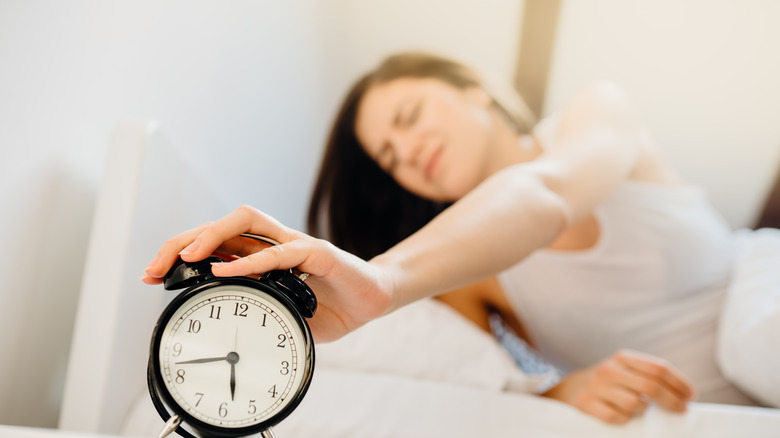This Is What Happens To Your Body When You Oversleep
Sleep is a key component to our overall physical and mental health. We always discuss how important it is for adults to get the National Sleep Foundation's guidelines of 7 to 9 hours of sleep a night, but did you know that sleeping too much can also have negative health impacts?
Researchers have linked oversleeping to medical issues like cognitive impairment, depression and other mental health disorders, inflammation, fertility issues, headache or back pain, as well as higher risks of diseases like Alzheimer's, obesity, diabetes, heart disease, and stroke (via Amerisleep). Oversleeping has also been linked to a higher risk of death overall.
The oversleeping issue could also be bigger than specific health concerns. Studies have also noted that depression and low socioeconomic status have strong ties to oversleeping, as people of lower socioeconomic status may have less access to healthcare and therefore more undiagnosed illnesses (via WebMD).
While the perfect amount of sleep may vary by person, experts say if you are regularly sleeping more than 9 hours a night, your quality of sleep may be lacking.
How good sleep hygiene can help with oversleeping
"Your body needs deep restorative sleep, and if that is not happening during the recommended 8 hours, your body will instinctively try to prolong the sleep period to obtain the quality of sleep it needs," Michele Roberge, leader of a hospital-based sleep disorder center, told Amerisleep.
Experts do note that there may be times in your life that require more sleep than others. For example, during a particularly stressful period or if you are suffering from an illness, your body may need more sleep than usual (via WebMD). It may also vary by your age, how active you are, and your current health status.
If poor sleep quality is what is causing you to spend more time snoozing, practicing good sleep hygiene may do the trick. You should check that you are sleeping in a quiet, dark room on a comfortable bed and keeping the same sleep schedule. Avoiding caffeine and alcohol may also be beneficial, according to WebMD.
If you still aren't keeping your sleep in the 7-9 hour range, seek medical attention to diagnose any underlying health conditions or sleep disorders that could be making you oversleep.


